
Not just because they're tasty, but also because they've helped the Californiabased registered dietitian fight back against the mounting war on ultraprocessed foods.
It all started in the summer of 2023, when author and infectious-disease physician Dr. Chris van Tulleken was promoting his book, Ultra-Processed People. While writing it, van Tulleken spent a month eating mostly foods like chips, soda, bagged bread, frozen food, and cereal. "What happened to me is exactly what the research says would happen to everyone," van Tulleken says: he felt worse, he gained weight, his hormone levels went crazy, and beforeand-after MRI scans showed signs of changes in his brain. As van Tulleken saw it, the experiment highlighted the "terrible emergency" of society's love affair with ultra-processed foods.
Wilson, who specializes in working with clients from marginalized groups, was irked. She felt that van Tulleken's experiment was oversensationalized and that the news coverage of it shamed people who regularly eat processed foods-in other words, the vast majority of Americans, particularly the millions who are food insecure or have limited access to fresh food; they also tend to be lower income and people of color. Wilson felt the buzz ignored this "food apartheid," as well as the massive diversity of foods that can be considered ultra-processed: a category that includes everything from vegan meat replacements and nondairy milks to potato chips and candy. "How can this entire category of foods be something we're supposed to avoid?" Wilson wondered.
This story is from the {{IssueName}} edition of {{MagazineName}}.
Start your 7-day Magzter GOLD free trial to access thousands of curated premium stories, and 9,000+ magazines and newspapers.
Already a subscriber ? Sign In
This story is from the {{IssueName}} edition of {{MagazineName}}.
Start your 7-day Magzter GOLD free trial to access thousands of curated premium stories, and 9,000+ magazines and newspapers.
Already a subscriber? Sign In
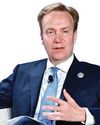
Q & A: Borge Brende
The World Economic Forum president talks with TIME editor Sam Jacobs

Q & A - Rene Haas
Arm's CEO on how his hardware is supporting the Fourth Industrial Revolution
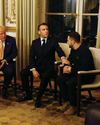
The conflicts looming over 2025
WHEN DONALD TRUMP TOOK THE OATH OF OFFICE AS President in January 2017, his first foreign policy priority was to get tough on China. The Trump 2.0 Administration will continue that work. But when he strides back into the Oval Office in January 2025, Trump will also become responsible for U.S. management of two dangerous wars, the kinds of hot foreign policy crises he was fortunate to avoid during his first term.
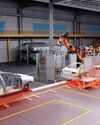
Rev Lebaredian
Nvidia's vice president of Omniverse and simulation technology on training AI-powered robots
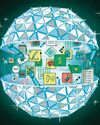
5 predictions for AI in 2025
New uses and policy questions come into focus
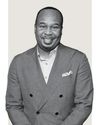
Roy Wood Jr. The comedian on his new stand-up special, the importance of working in food service, and learning from Keanu Reeves
8 QUESTIONS WITH Roy Wood Jr.
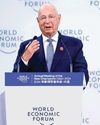
A call for global cooperation in the Intelligent Age
Cultivate wisdom along with innovation
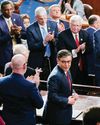
The D.C. Brief
IN THE END, THE THREAT OF A FARright revolt proved more menacing than most imagined, as Republican Mike Johnson initially came up short on Jan. 3 during the first balloting to keep him as Speaker.
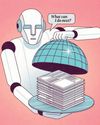
The digital labor revolution
OVER THE PAST TWO YEARS, WE'VE WITNESSED advances in AI that have captured our imaginations with unprecedented capabilities in language and ingenuity. And yet, as impressive as these developments have been, they're only the opening act. We are now entering a new era of autonomous AI agents that take action on their own and augment the work of humans. This isn't just an evolution of technology. It's a revolution that will fundamentally redefine how humans work, live, and connect with one another from this point forward.

Tech we can trust
Serving humanity's best interests must be at the center of progress